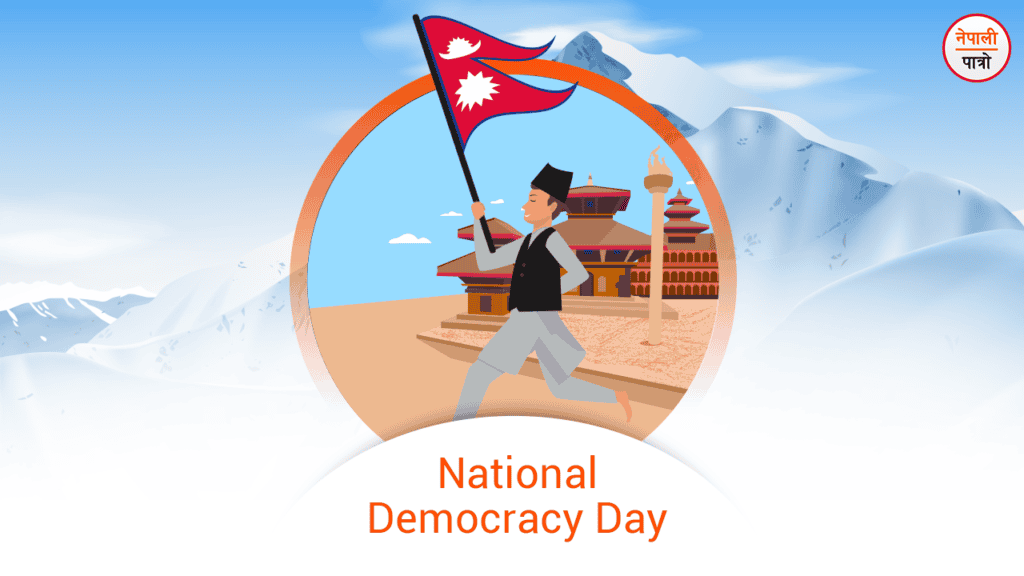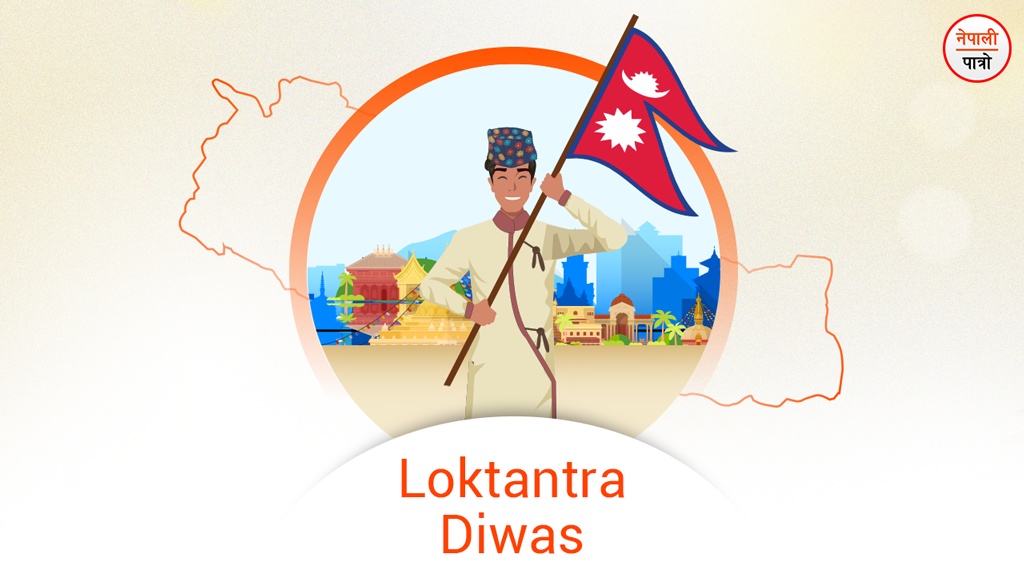
Democracy Day – Prajatantra Diwas
In the history of Nepal, the Nepalese people made long struggles and lots of sacrifices against the cruel Rana regime which ruled for one hundred and four years. Due to the establishment of democracy in Nepal on Falgun 7th, in 2007 B.S. every year, Democracy Day/ Prajatantra Diwas is celebrated as a national festival.
Democracy Day – Prajatantra Diwas
The Ranas, who exploited the royal power and the national treasury in enjoyment and having fun, whereas the Nepalese people, in general, were subjected to extreme oppression and exploitation by living in the throes of illiteracy, scarcity, and fear. Therefore, the Nepalese people had to make long struggles and sacrifices against the oppressive Rana regime’s totalitarian rule.
In the beginning, Rashtriya Praja Parishad and later the Nepali Congress Party was created in order to mobilize against the Rana regime’s rule. At that time, there was a surging wave of independence in India as well as in other neighboring countries. The then King Tribhuvan also supported the Nepalese people’s desire to be independent. The revolution was started by the Nepali Congress party. The King and his family abandoned his palace and the royalty reached the shelter at the Indian Embassy.
The Ranas tried to return the king, but they were unable to. The royal family reached New Delhi without the permission of the then Shree 3 Rana regime. Gyanendra, a minor Grandson of King Tribhuvan, who was left at his maternal home, was crowned King, but the Ranas failed to gain any kind of international support. Thus, the Rana Prime Minister was widely criticized in the international world.
The Nepalese people waged a struggle against the Rana government all over the country. From all places outside the valley, the rulers appointed by the Rana Prime Minister were being chased down. Many places, from the east to the west, were occupied by the Salvation Army (Mukti Sena) and in those places, a public government was formed. The public government urged the people not to pay the taxes levied by the Ranas. As the Ranas were being kicked in from everywhere, they were forced to kneel down before the people.
On the request of Rana Prime Minister Mohan Shamsher, a tripartite Delhi agreement was signed between the Ranas, Nepali Congress and then King Tribhuvan on 2007 B.S Falgun 1st, under the mediation of the then Indian Prime Minister Jawaharlal Nehru. King Tribhuvan returned to Nepal on Falgun 4th and declared democracy on Falgun 7th. Thus, the rule of 104 years of the Rana regime ended and democracy was established in Nepal. After the declaration of democracy, a new cabinet was announced with the participation of both the Ranas and the Nepali Congress party. And, the Interim Government of Nepal Act 2007 was also issued. This was the first practice of the rule of law in the history of Nepal.
The revolution of the year 2007 B.S is called the democratic movement of Nepal. It was the people’s first historic revolution. With this revolution, the governing bodies were handed over to the Nepalese people’s by the Rana regime. But, in the history of Nepal, however, the lack of skilled leadership to protect democracy obtained from the sacrifices of the people has always been a door knocker. Taking advantage of this weakness, King Mahendra dismissed the people’s elected government in the year 2017 B.S and established a monarchy by the name of the “Panchayat system”. About 30 years later, the Panchayat system led by the king collapsed and democracy was restored.
Nevertheless, the Nepalese people could not get skilled people’s representatives’ who can understand the sacrifice of the people and establish People’s democracy governed by the people, for the people, by the people, or govern the state. The politics of the country as a whole could not rise above the transient implications of the people and the party. King Gyanendra received the same opportunity created because of the lack of good leadership. But, his autocracy did not last long. As a result, the country achieved a Monarchic Democratic System, a sophisticated form of democracy without the monarch.
In this way, the Nepalese people had to struggle and sacrifice for a long period of time to establish a system of governing by their own elected representatives. Therefore, a tradition of paying homage has been established in the memory of national martyrs and national heroes who sacrificed their lives for the sake of democracy/ prajatantra. But despite the rule of law established in the system, the country has not been saved from scarcity, illiteracy, and unemployment.
Nepali society has not been able to prosper due to the lack of timely development infrastructure in the country. Although the law has changed, the general mindset has not changed yet. The country has not been able to take the path of development and prosperity. The political parties have been indulging in personal interests, not in the interest of the country.
Therefore, the significance of celebrating democracy day/ prajatantra diwas is to make the country prosperous by fulfilling the dream of heroic martyrs who sacrificed their lives for the sake of democracy and republic. The country is ending through natural exploitation which has to be revitalized and fertilized again. It is up to the individual and the party to accept the national interest rising above personal or political interest. The plan has to be made to bring the country to the height of a sustainable, free-from-need, developed nation by planning for centuries and millennia.
Nepal has now entered into a new era, crossing the struggle from democracy to a republic. While the republic is being institutionalized as a sophisticated political system, there is a lack of dignified political culture among the parties. Even after the total collapse of the monarchy, the political parties have not been able to rise above the old system. They have neither the consensus nor the feeling of coexistence. Therefore, it is today’s need for democracy/ prajatantra that the ruling party should abandon the pomp of power and the opposing parties should not have a defeat in their mindset but should be focused on instituting the development and prosperity achieved so far. To Read this article in the Nepali Language please click here.
Related Posts
 array(1) {
[0]=>
object(WP_Term)#1977 (16) {
["term_id"]=>
int(761)
["name"]=>
string(13) "National Days"
["slug"]=>
string(16) "national-days-en"
["term_group"]=>
int(0)
["term_taxonomy_id"]=>
int(761)
["taxonomy"]=>
string(8) "category"
["description"]=>
string(0) ""
["parent"]=>
int(0)
["count"]=>
int(17)
["filter"]=>
string(3) "raw"
["cat_ID"]=>
int(761)
["category_count"]=>
int(17)
["category_description"]=>
string(0) ""
["cat_name"]=>
string(13) "National Days"
["category_nicename"]=>
string(16) "national-days-en"
["category_parent"]=>
int(0)
}
}
national-days-en
National Days
array(1) {
[0]=>
object(WP_Term)#1977 (16) {
["term_id"]=>
int(761)
["name"]=>
string(13) "National Days"
["slug"]=>
string(16) "national-days-en"
["term_group"]=>
int(0)
["term_taxonomy_id"]=>
int(761)
["taxonomy"]=>
string(8) "category"
["description"]=>
string(0) ""
["parent"]=>
int(0)
["count"]=>
int(17)
["filter"]=>
string(3) "raw"
["cat_ID"]=>
int(761)
["category_count"]=>
int(17)
["category_description"]=>
string(0) ""
["cat_name"]=>
string(13) "National Days"
["category_nicename"]=>
string(16) "national-days-en"
["category_parent"]=>
int(0)
}
}
national-days-en
National Days
Loktantra Diwas
 array(1) {
[0]=>
object(WP_Term)#1998 (16) {
["term_id"]=>
int(761)
["name"]=>
string(13) "National Days"
["slug"]=>
string(16) "national-days-en"
["term_group"]=>
int(0)
["term_taxonomy_id"]=>
int(761)
["taxonomy"]=>
string(8) "category"
["description"]=>
string(0) ""
["parent"]=>
int(0)
["count"]=>
int(17)
["filter"]=>
string(3) "raw"
["cat_ID"]=>
int(761)
["category_count"]=>
int(17)
["category_description"]=>
string(0) ""
["cat_name"]=>
string(13) "National Days"
["category_nicename"]=>
string(16) "national-days-en"
["category_parent"]=>
int(0)
}
}
national-days-en
National Days
array(1) {
[0]=>
object(WP_Term)#1998 (16) {
["term_id"]=>
int(761)
["name"]=>
string(13) "National Days"
["slug"]=>
string(16) "national-days-en"
["term_group"]=>
int(0)
["term_taxonomy_id"]=>
int(761)
["taxonomy"]=>
string(8) "category"
["description"]=>
string(0) ""
["parent"]=>
int(0)
["count"]=>
int(17)
["filter"]=>
string(3) "raw"
["cat_ID"]=>
int(761)
["category_count"]=>
int(17)
["category_description"]=>
string(0) ""
["cat_name"]=>
string(13) "National Days"
["category_nicename"]=>
string(16) "national-days-en"
["category_parent"]=>
int(0)
}
}
national-days-en
National Days
January 15, 2024 6 months
I want to know list of names of Nepal’s first ministers name from both Rana’s and Congress parties established on 2007-falgun-07 (Democracy Day)???